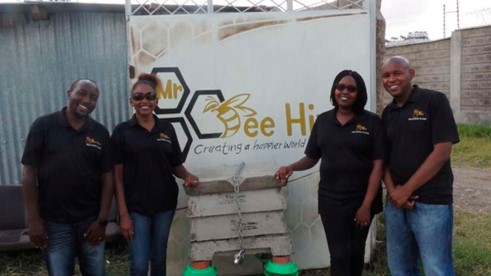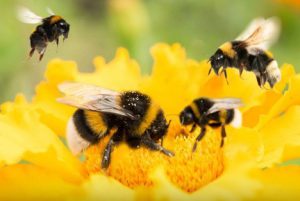African beekeepers’ innovation makes beekeeping returns sweeter

From left; Joseck Matheri , his wife Janet and Calvin Tiony and his spouse Yvonne, founders of Mister Be Concrete Hives at their workshop in Syokimau
For years, Joseck Matheri, Calvin Tiony and their wives watched helplessly as honey badger, an animal bigger than a cat but smaller than a dog, held their venture hostage.
Whenever they put up beehives, it would destroy them in pursuit of its favourite meal: honey. It was heartbreaking and they contemplated giving up on the venture despite the promise of good returns.
The question at the back of their minds was, “how do we handle the honey badger.”
“Beekeepers will tell tales of how they’ve lost huge investments to this small but very courageous animal,” Joseck says. “I know of a farmer who lost 17 hives in a single night, that’s less than twelve hours.”
But it’s not only the honey badger that the beekeepers had to contend with. Honey production is also curtailed by the weather – whether it’s too hot or too cold – theft of beehives and wax moths that eat combs, particularly those that contain brood and pollen.
“The only known treatment for wax moth is fire treatment. With most of the hives made of wood, it becomes a case of throwing out the baby and the bathwater. Such losses discourage many from venturing into this highly lucrative industry,” he says.
And in 2020 after investing many hours and millions of shillings, the families came up with a solution: concrete beehives under their company, Mister Bee Concrete Hives. A first of its kind in the country, this honey-holding container is a gamechanger.
“We chose to work with concrete because it was a material too strong enough for the honey badger but also because of its thermodynamic characteristics,” says Calvin, an engineer and the technical head at the company. To appreciate the ingenuity of this hive, one must first understand bees and wooden hives.
In a wooden hive, honey output during the hot season is low as bees spend a majority of their time flapping their wings to cool the internal temperature. When it’s cold, they clamp together to keep warm. But concrete as a non-heat conductor doesn’t allow heat inside or outside.
To read the complete article go to;
Couples’ innovation makes beekeeping returns sweeter – Business Daily (businessdailyafrica.com)
“They may be tiny but bees are the lifeline of planet Earth,” Janet concludes.





